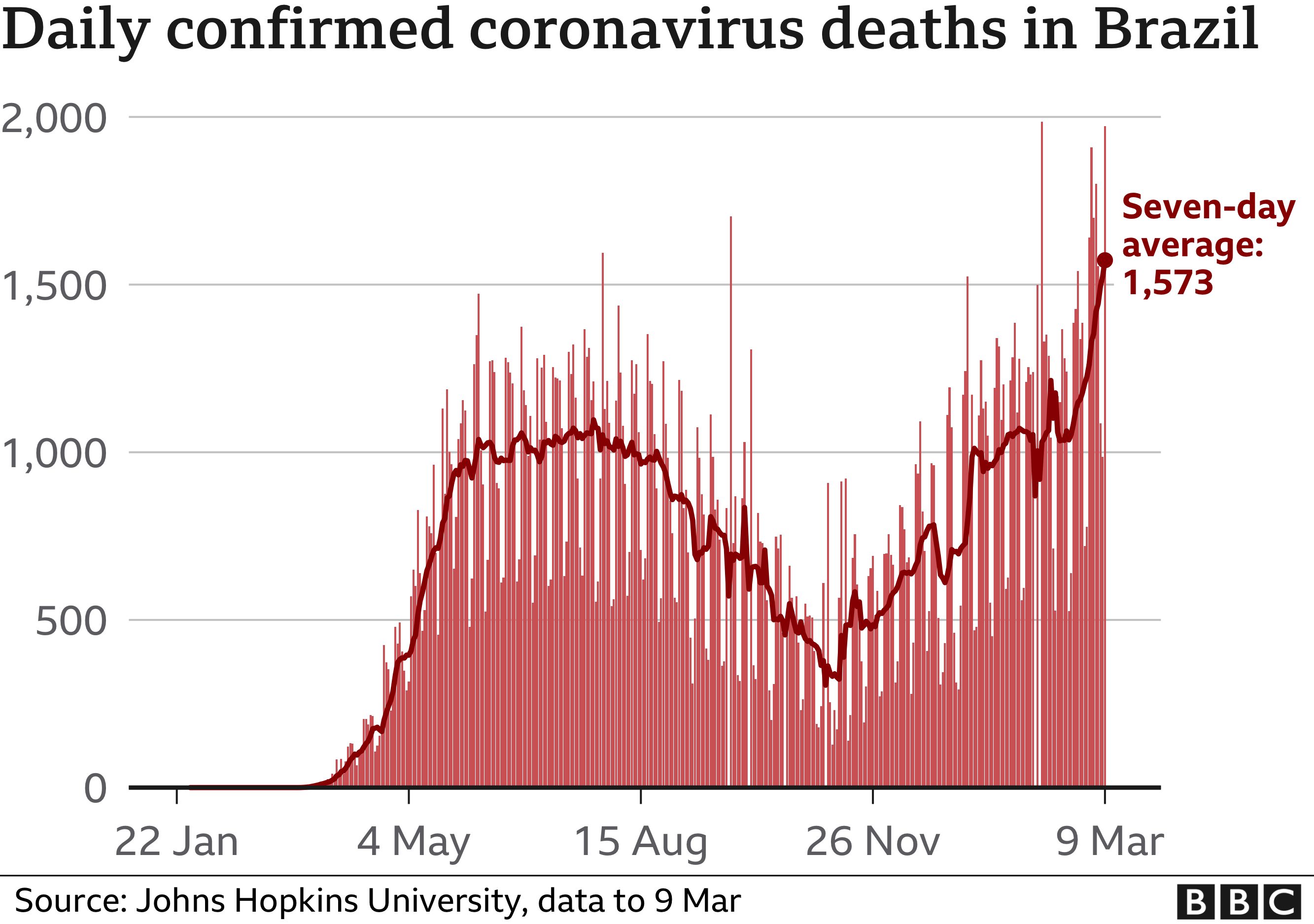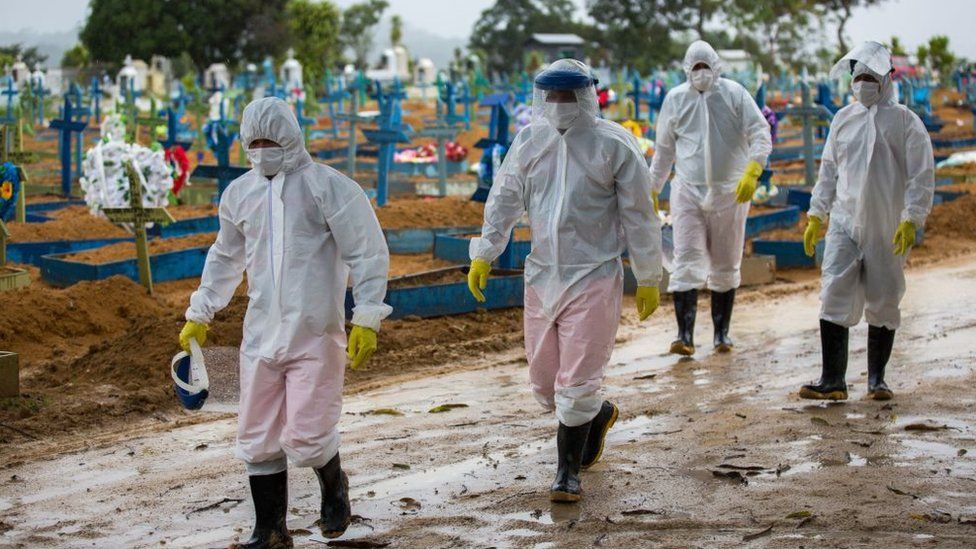

Health systems in most of Brazil’s largest cities are close to collapse because of Covid-19 cases, its leading health institute warns.
More than 80% of intensive care unit beds are occupied in the capitals of 25 of Brazil’s 27 states, Fiocruz said.
Experts warn that the highly contagious variant in Brazil may have knock-on effects in the region and beyond.
“Brazil is a threat to humanity,” Fiocruz epidemiologist Jesem Orellana told AFP news agency.
The country has recorded more than 266,000 deaths and 11 million cases since the pandemic began.
It has the second highest number of deaths in the world after the US and the third highest number of confirmed cases.
Despite this, President Jair Bolsonaro has consistently opposed quarantine measures and expert advice on fighting coronavirus.
On Tuesday the country recorded 1,972 Covid deaths, a new daily record.
According to Fiocruz, 15 state capitals have intensive care units (ICUs) that are at more than 90% capacity including Rio de Janeiro, Brasilia and São Paulo.
Two cities – Porto Alegre and Campo Grande – have exceeded ICU capacity.
In its report, the institute warned that figures pointed to the “overload and even collapse of health systems”.




“The fight against Covid-19 was lost in 2020 and there is not the slightest chance of reversing this tragic circumstance in the first half of 2021,” Fiocruz’s Jesem Orellana said, quoted by AFP.
“The best we can do is hope for the miracle of mass vaccination or a radical change in the management of the pandemic. Impunity in management seems to be the rule.”
On Tuesday, the country also recorded more than 70,000 cases, a 38% increase on last week, according to local media. The surge in cases has been attributed to the spread of a highly contagious variant of the virus – named P1 – which is thought to have originated in the Amazon city of Manaus.
Preliminary data from the University of São Paulo, Imperial College London and Oxford University suggests the P1 variant could be up to twice as transmittable as the original version of the virus.
It also suggests that the new variant could evade immunity built up by having had the original version of Covid. The chance of reinfection is put at between 25% and 60%.

Last week, the Fiocruz Institute said that P1 was just one of several “variants of concern” that have become dominant in six of eight states studied by the Rio de Janeiro-based organisation.
“This information is an atomic bomb,” said Roberto Kraenkel, of the Covid-19 Brazil Observatory, told the Washington Post.
World Health Organization Director General Tedros Adhanom Ghebreyesus has described the situation in Brazil as “very concerning” and warned of a possible regional spillover.
“If Brazil is not serious, then it will continue to affect all the neighbourhood there and beyond.”


Scientists are concerned that Brazil has almost become a “natural laboratory” – where people can see what happens when coronavirus goes relatively unchecked.
Some warn the country is now a breeding ground for new variants of the virus, unhindered by effective social distancing and fuelled by vaccine shortages.
That’s because the longer a virus circulates in a country, the more chances it has to mutate – in this case giving rise to P1.
Scientists say it is partly the spread of P1 around Brazil that is behind the current devastating upsurge in infections.
Global experts are calling for a plan – including rapid vaccination, lockdowns, and strict social distancing measures – to get the situation under control.
Viruses do not respect borders. The worry is that the P1 variant is a looming threat over the progress made in the region and the wider world.
Current vaccines are, on the whole, still effective against the variant but may be less so than against the earlier versions of the virus they were designed to fight.
Much of this evidence comes from lab studies and preliminary research involving a relatively small number of people.
Studies are ongoing but experts will get their most robust understanding of how well these vaccines work against P1 as they continue to monitor people who have been vaccinated in the real world.
Scientists are confident that, if necessary, vaccines can be tweaked fairly quickly to work against new variants.

Brazil has ordered more than 200 million doses of the AstraZeneca and CoronaVac vaccine. So far, more than eight million people have had their first dose, representing just 4% of the population.
Fiocruz’s head of production, Mauricio Zuma, said on Monday that preliminary studies of the AstraZeneca vaccine showed it would protect against the P1 variant. However, the Oxford team behind the vaccine earlier said it offers less protection – but should still protect against severe illness.
According to Reuters, another Brazilian study has indicated the CoronaVac vaccine, made by China’s Sinovac biopharmaceutical company, is effective against the same variant.
The Pfizer-BioNTech vaccine has been able to combat the Brazil variant, according to laboratory research published on Tuesday by the New England Journal of Medicine. Blood taken from people who had been given the vaccine “neutralised” an engineered version of the virus that contained the same mutations found in the Brazil variant.
However, the Pfizer vaccine has not yet been rolled out in the country, as the Brazilian authorities are still in negotiations with the company over its purchase. According to Reuters, Economy Minister Paulo Guedes said Pfizer had agreed to deliver 14m doses by June after a video call with President Bolsonaro.
Since the start of the pandemic, President Bolsonaro has sought to downplay the threat posed by the virus, and earlier this week he told people to “stop whining”.
A number of quarantine measures have been taken by mayors and regional governors, which Mr Bolsonaro has opposed, arguing that the collateral damage to the economy will be worse than the effects of the virus itself. –bbc.com